Did you know heating water accounts for nearly 20% of your home’s energy usage? If you’re tired of high utility bills or want to reduce your carbon footprint, the newest generation of energy-efficient water heaters could save you hundreds each year—without sacrificing comfort or performance. Discover why today’s top heat pump, tankless, and solar water heaters are changing the way American households heat water, and how you can upgrade for bigger savings.

Discover How Energy-Efficient Water Heaters Can Transform Your Bills
Switching to energy-efficient water heaters is one of the smartest ways to lower your ongoing utility bills while increasing household comfort. Traditional water heating systems, especially older electric or gas tank units, can be huge energy hogs. Newer technologies like heat pump water heaters or advanced tankless units are designed to heat water using less electricity or by leveraging renewable sources, which can slash your hot water energy costs by as much as 60% according to the U.S. Department of Energy.
Not only do these upgrades mean lower monthly costs, but many models also qualify for rebates, tax credits, and incentives—putting extra savings right in your pocket. If you’re planning to replace a failing water heater or proactively seeking an investment in long-term energy efficiency, exploring innovative water heating options could be your ticket to substantial savings, improved reliability, and greater peace of mind.
Practical examples include families upgrading from a standard electric tank to a heat pump water heater , who often see their energy bills decrease noticeably. In climates with ample sun, solar water heaters can provide most or all hot water needs for much of the year, resulting in dramatic reductions in utility expenses. These advances make it easier than ever to ensure your household has consistent, affordable hot water.
Understand the various types of energy-efficient water heaters available today
Explore the latest advancements in heat pump water heater technology
See side-by-side comparisons of traditional vs. energy-efficient water heaters
Learn about energy efficiency ratings and their impact on long-term savings
Find answers to the most common questions about water heater options
"Did you know that switching to an energy-efficient water heater can reduce your home's water heating costs by up to 60%?" – U.S. Department of Energy
Energy-Efficient Water Heaters: Key Features and Benefits
Today’s energy-efficient water heaters come packed with features that go beyond simple hot water delivery. These systems—like heat pump water heaters , tankless models, and solar options—are built for efficiency, reliability, and user-friendly performance. Key advantages include lower energy costs , longer lifespans, and smaller environmental footprints. Many high-efficiency units also support smart home integrations, giving you precision control over schedules and tracking.
Whether you opt for a heat pump water heater that harnesses ambient air, a tankless system providing instant hot water, or a solar setup tapping into renewable energy, the benefits are tangible. Reduced standby heat loss, faster recovery times, adaptive heating controls, and robust insulation make modern water heaters a wise upgrade for homes of all sizes. Higher upfront costs can often be offset by rebates, energy savings, and tax credits year after year.
Many energy-efficient water heaters also carry superior warranties and often qualify for exclusive manufacturer or utility rebates. These incentives help lower initial installation costs, while the decreased energy use translates to continuing utility bill reductions with every shower or laundry load.
How Do Energy-Efficient Water Heaters Work?
The most advanced energy-efficient water heaters use innovative technologies to minimize energy costs without compromising your comfort. Heat pump water heaters draw warmth from the air and transfer it into water, effectively multiplying every watt of electricity used. Instead of generating heat directly—like a traditional electric model—a heat pump moves ambient heat, making it several times more efficient.
Tankless water heaters, another energy-saving leader, only heat water when you need it. Instead of maintaining a full tank of hot water 24/7, tankless models deliver a stream of hot water on demand, eliminating standby losses and reducing energy costs . Solar water heaters take advantage of rooftop solar panels to preheat or fully heat your water with clean, renewable energy for even bigger cost savings.
Insulation, advanced thermostats, adaptive heating cycles, and smart sensors play a big role in maximizing energy efficiency across all modern water heaters. These features all contribute to consistently hot water at a fraction of the traditional energy required, making the latest water heating systems a smart bet for long-term savings and performance.
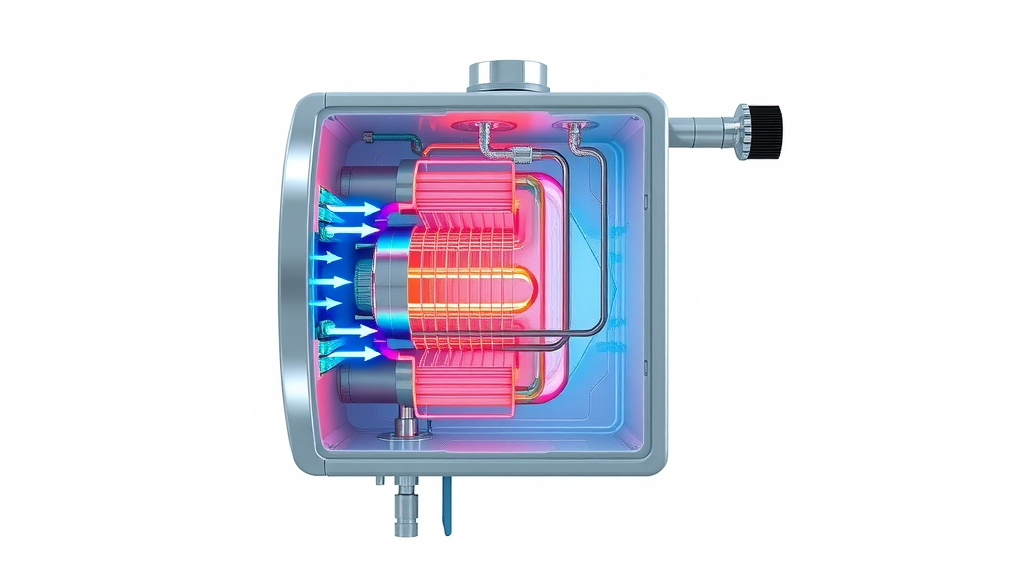
Heat Pump Water Heaters: Why They're Leading the Market
Heat pump water heaters have rapidly become the market’s gold standard for efficient water heating. Unlike standard electric heat heaters, these units work by capturing warmth from the surrounding air—much like an air conditioner in reverse. This unique process enables them to use as little as a third of the energy required by traditional water heaters, slashing your energy costs and reducing your carbon footprint.
Modern heat pump water heaters offer impressive hot water recovery times, operate efficiently even in cooler temperatures, and many are eligible for federal tax credits, utility rebates, and other cost-saving incentives. Their increasing market share is also driven by a demand for sustainable solutions and improved technology—making them a future-proof investment for any home.
Manufacturers continue to improve durability, noise reduction, and installation flexibility. These units are especially ideal for households with high hot water demands or those looking to significantly lower their energy usage while maintaining steady supply. As incentives and rebates expand nationwide, heat pump water heaters are leading the way for smarter water heating in the United States.
Hot Water When You Need It: Fast Recovery and Consistent Performance
One common concern when switching to an energy-efficient water heater is whether you’ll sacrifice the convenience of fast, plentiful hot water. The latest heat pump water heaters and high-efficiency tankless systems have resolved these worries, offering quick hot water delivery and ample supply regardless of family size.
Innovative features—like adaptive heating elements, advanced water mixing, and smart thermostats—ensure that modern systems respond to your peak demands. This means you can power through back-to-back showers, large laundry loads, or dinner dishes without waiting ages for water to reheat. With the right unit, consistent performance and quick recovery become part of everyday life, even for busy households.
Additionally, many energy-efficient water heaters have user-friendly displays or mobile apps, allowing you to monitor heating patterns and track energy use over time. Continuous feedback and performance data ensure your water heating remains both efficient and reliable for years to come.
Comparison of Traditional Water Heaters vs. Energy-Efficient Water Heaters | ||
Feature |
Traditional Water Heater |
Energy-Efficient Water Heaters |
|---|---|---|
Energy Savings |
Standard Efficiency, Higher Operating Cost |
Up to 60% Lower Energy Use |
Upfront Cost |
Low/Moderate |
Moderate/Higher (offset by rebates & incentives) |
Average Lifespan |
8-12 years |
10-15+ years |
Rebate Eligibility |
Limited or None |
Often Eligible for Tax Credits & Rebates |
Types of Energy-Efficient Water Heaters You Should Consider
Today's market offers multiple energy-efficient water heating options, each with distinct benefits. The main categories include heat pump water heaters , tankless (on-demand) water heaters , and solar water heaters . Choosing the right type depends on your household needs, climate, energy goals, and budget—but all models are designed to provide significant savings and long-term reliability.
Comparing these options side-by-side helps highlight specific strengths. Heat pump models are particularly effective for families with higher hot water demand, while tankless and solar water heaters excel where space or access to renewable energy are priorities. No matter the system, making the switch to energy-efficient technology is a proven way to lower your utility bills and future-proof your home’s energy use.
Below, we explore the most popular types, upgrade benefits, and modern advancements that make each one a compelling alternative to older, less efficient heaters.
Heat Pump Water Heaters: Combining Innovation and Savings
The flagship of today’s high-efficiency water heating market, the heat pump water heater uses electricity to move heat rather than generate it directly. This allows it to deliver up to three or four times more energy than it consumes. By extracting ambient warmth from air (even in basements or utility rooms), these units dramatically reduce overall energy usage.
Heat pump water heaters come with digital controls, adaptable temperature settings, and robust safety features. Many models offer hybrid modes, combining heat pump and electric elements for maximized performance. Incentives such as tax credits and rebates are often specifically targeted at heat pump water heater purchases, further reducing net expenses and boosting return on investment.
The result is lower utility bills every month and a healthier environment, all without sacrificing hot water reliability.
Tankless Energy-Efficient Water Heaters: Endless Hot Water
Tankless water heaters are rapidly growing in popularity for homes looking for unlimited hot water on demand. Instead of storing heated water, these units instantly heat water as it flows through, making them both energy-efficient and space-saving. As there’s no tank to keep warm, energy costs associated with standby heat loss are virtually eliminated.
The compact design makes tankless models ideal for tight spaces, apartments, and retrofits. While the initial cost is often higher than a basic tank, energy savings, longer lifespan, and the promise of endless hot water offset the expense over time. They also boast minimal maintenance, quieter operation, and excellent reliability. Perfect for households with fluctuating hot water needs, tankless water heaters are a strong choice on the energy-efficient market.
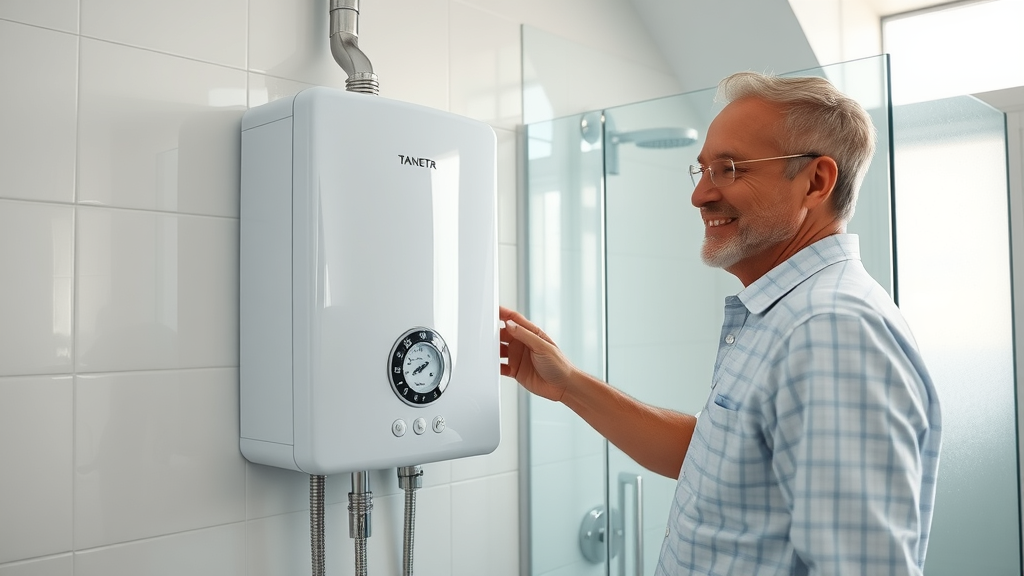
Solar Water Heaters: Harnessing Natural Power
Solar water heaters are an excellent option for leveraging renewable energy and optimizing energy saving . These systems use roof-mounted solar collectors to preheat, or even fully heat, your home’s water supply. By drawing power from the sun, solar water heaters can lower energy bills substantially and reduce reliance on fossil fuels—especially in sunny climates.
Solar water heating technologies are advancing rapidly, with improved freeze protection, backup heating integration, and smart controls making them more adaptable for all regions. While the upfront costs are the highest among efficient systems, substantial rebates, tax incentives, and very low ongoing expenses lead to significant long-term savings. If you want to minimize your carbon footprint and have reliable hot water, solar is a compelling, future-friendly solution.
Most solar water heaters work seamlessly with backup electric or gas water heaters, ensuring you always have hot water—even during cloudy days or high-demand periods.
Choosing the Right Water Heater for Your Home
Picking the ideal energy-efficient water heater starts with considering your home’s specific needs. Factors like household size, daily hot water consumption, existing infrastructure, and local climate all play a crucial role in system selection. It's also important to balance initial costs against potential energy savings and available incentives to maximize your investment's value over time.
Many homeowners consult with professional installers or use online calculators to estimate annual energy savings and payback periods. Comparing efficiency ratings, warranty terms, and anticipated maintenance requirements can help ensure your chosen water heater fits both your budget and your long-term comfort expectations.
Finally, remember to check for federal tax credits and local utility rebates that may offset the cost of high-efficiency water heaters. Many official government organization websites and secure websites use https to provide updated rebate lists and reliable guidance for your unique situation.
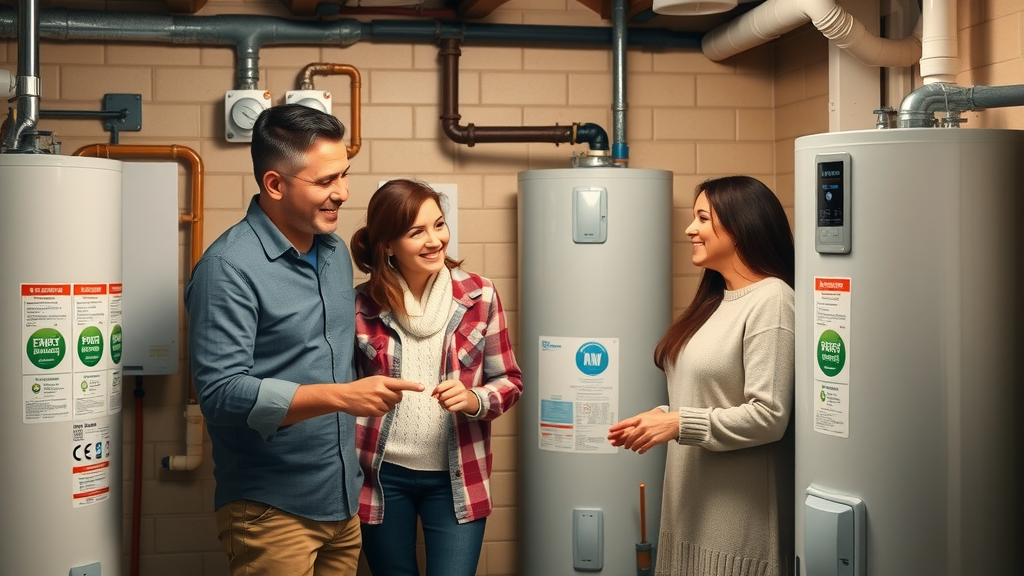
Factors to Consider: Family Size, Hot Water Demand, and Energy Efficiency
The right energy-efficient water heater for your home depends on several household-specific characteristics. For larger families, a hybrid or heat pump water heater with high recovery rates ensures enough hot water is available even during peak usage periods. For smaller homes or apartments, tankless models offer space savings and on-demand performance that deliver both efficiency and convenience.
It’s also vital to consider your region’s climate—heat pump water heaters thrive in warmer environments, while solar water heaters excel in areas with ample sun. Carefully evaluate energy efficiency ratings, estimated lifetime savings, and necessary maintenance efforts when comparing options. Prioritizing these factors helps ensure your investment pays off in real, sustained savings and satisfaction.
Lastly, think about system compatibility with your existing plumbing, the potential complexity of installation, and whether future upgrades or smart integrations might be needed. Taking the time to compare features and requirements will help you choose confidently and maximize your energy-saving outcomes.
Understanding Water Heater Energy Efficiency Ratings
Energy efficiency ratings are the most reliable indicators of a water heater's cost-saving potential. Ratings like the Uniform Energy Factor (UEF), Energy Factor (EF), and ENERGY STAR certification are designed to help consumers make smart, apples-to-apples comparisons across brands and types of water heaters.
Heat pump water heaters and tankless models often score much higher on these scales than standard electric or gas tank systems. A higher UEF means your heater converts more electrical energy into usable hot water, reducing both waste and utility costs. The best-performing models frequently display ENERGY STAR labels and may be eligible for higher tiers of rebates or tax credits.
Be sure to check these ratings before purchase, and look for official government websites or secure websites for up-to-date guidance. Understanding how these measures impact your real-world energy use is essential for maximizing both immediate rebates and ongoing savings on your energy bills.
"A quality heat pump water heater can cut energy use by more than half compared to conventional models." – Energy Star
Popular Heat Pump Water Heater Brands and Reviews
The surge in demand for heat pump water heaters has led to a wide selection from established brands. Leading manufacturers in the United States like Rheem, AO Smith, Bradford White, and GE Appliances offer models celebrated for durability, efficiency, and customer support. These brands regularly innovate with digital controls, silent operation, and convenient maintenance features, making them the go-to choices for savvy homeowners.
When comparing brands, look for ENERGY STAR certification, robust warranties, and eligibility for state or federal rebates. Many secure websites and official government resources list up-to-date reviews and user feedback, allowing you to shop with confidence and clarity. With so many high-quality options on the market, you can easily find a model tailored to your needs and budget while maximizing your energy savings.
Below, see which brands earn the highest marks for reliability and performance.
Top Rated Heat Pump Water Heaters on the Market
The top-rated heat pump water heaters of 2024 include the Rheem ProTerra Hybrid, AO Smith Voltex, Bradford White AeroTherm, and GE GeoSpring. Each offers advanced efficiency, schedule programming, anti-corrosion construction, and cutting-edge insulation. Models are available across a range of capacities, ensuring a perfect match for homes small and large.
Consumers prioritize units with intuitive digital interfaces, energy usage reporting, and top-tier warranty support. These water heaters often lead professional “best of” lists and receive glowing reviews for ease of installation and silent operation. Shoppers should read independent reviews and compare key features—like first-hour delivery and recovery rates—to select the optimal system for their needs.
ENERGY STAR-certified units are especially valuable, as they guarantee high performance, low maintenance, and broad rebate eligibility from both utility companies and local governments. Always consult securely connected websites for the most current ratings and offers in your state.
What Consumers Say: Energy-Efficient Water Heater Reviews
Homeowners who upgrade to energy-efficient water heaters frequently report dramatic cuts in their monthly energy bills—sometimes up to half after switching from standard electric or gas tanks. Users of heat pump and tankless models praise the reliability and convenience of consistent hot water, even during high demand periods.
Many consumers highlight the peace of mind from long warranties, low maintenance needs, and access to rebates or tax credits. Critics sometimes cite higher upfront purchase costs, but most find the investment pays off quickly thanks to ongoing energy savings. Crowdsourced reviews and testimonials from official government organization websites and secure consumer resources can provide unfiltered feedback for those considering a purchase.
In short, satisfaction rates are high among buyers of modern, high-efficiency water heaters—especially when the selection is tailored to the household's unique hot water needs and future plans.
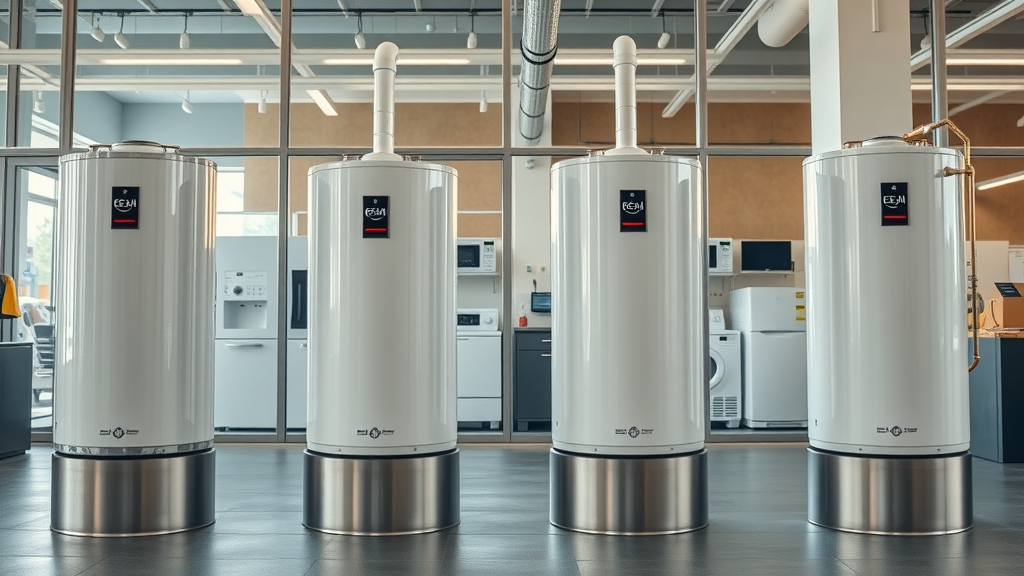
Warranty and Support: What to Watch For When Buying
Strong warranty coverage and customer support are essential when investing in a high-efficiency water heater. Most reputable brands offer warranties of 5-10 years on major components, providing protection against material or manufacturing defects. Service support, parts availability, and access to certified installers should also be important parts of your decision-making process.
Read all warranty terms carefully; some warranties require professional installation or periodic maintenance to stay valid. Secure websites and official government resources can provide lists of certified service providers by region. Remember, better support not only covers repair costs but also ensures peace of mind throughout your heater’s service life.
Choose brands that maintain extensive parts networks in the United States and receive positive reviews for fast, friendly response to service calls. A reliable warranty, coupled with extensive customer support, protects your investment and ensures uninterrupted, energy-efficient hot water for years to come.
Installation and Maintenance of Energy-Efficient Water Heaters
Proper installation and ongoing care are key to extracting maximum performance and savings from your energy-efficient water heater . While handy homeowners may consider DIY installation, professional setup guarantees manufacturer warranties are honored and ensures optimal, safe operation—particularly for heat pump and solar systems which require electrical, plumbing, and sometimes structural expertise.
Routine preventive maintenance helps sustain high energy efficiency and prolongs equipment life. Most manufacturers recommend annual cleaning of air filters, descaling, and thermostat checks, while solar water heaters may require periodic inspection of collector panels and fluid levels. These steps keep your system running at peak performance with minimal energy waste.
Smart homeowners schedule annual professional maintenance to spot minor issues before they turn into costly repairs. Proactive care boosts efficiency, prevents downtime, and helps you lock in savings year after year.
Professional Installation vs. DIY: What You Need to Know
While some simpler tankless or electric water heater models can be installed by skilled DIYers, many high-efficiency systems—especially heat pump or solar water heaters—require complex electrical and plumbing work best left to licensed professionals. Professional installation maximizes efficiency, ensures all local codes are met, and reduces the risk of accidental leaks, electrical faults, or voided warranties.
Certified installers stay updated on manufacturer best practices and can provide valuable insights into system customization or setup, adapting water heat delivery to your specific family size and household patterns. Moreover, installation by a licensed pro is often a prerequisite for qualifying for certain rebates, tax credits, or warranty protections. Always use an installer who is safely connected to an official organization in the United States, and consult securely connected, reputable sources for recommendations.
When making your decision, weigh the upfront savings of DIY against the long-term security, performance, and ongoing support provided by expert installation.
Maintaining Your Heat Pump Water Heater for Maximum Savings
Heat pump water heaters are designed for years of reliable, energy-saving performance—but regular maintenance makes all the difference. Most manufacturers recommend cleaning air filters every one to three months (depending on usage and household dust levels), checking condensate drains, and inspecting insulation annually.
In addition, periodic descaling or flushing of the tank helps prevent mineral build-up, which can reduce efficiency over time. For systems with digital controls, update firmware and monitor error codes as recommended. Smart monitoring features can often alert you to issues before they turn into costly breakdowns.
Partner with a qualified technician for an annual checkup. They’ll perform a comprehensive inspection, ensure all sensors and controls are operational, and help you maintain compliance for warranties and rebates. A little attention each year can keep your heat pump water heater running at top efficiency well into the future.
The Real Cost Savings of Energy-Efficient Water Heaters
Upgrading to an energy-efficient water heater isn’t just about helping the planet—it’s a tangible way to save real money, year after year. Average households in the United States may cut their water heating costs by hundreds of dollars annually, especially when switching from aging electric tanks to a new heat pump, tankless, or solar water heater.
Many homeowners see their initial investment pay for itself within three to five years due to ongoing utility bill reductions and available rebates. If you factor in increased property values and warranty savings, the real net cost is often far lower than sticking with an inefficient legacy system. Sites run by the states government and official government organizations regularly update rebate and cost info for your region—making it easy to estimate your long-term benefits.
Annual Cost Savings: Heat Pump Water Heater vs. Standard Water Heater | ||
System Type |
Average Annual Operating Cost |
Estimated Annual Savings |
|---|---|---|
Standard Electric/Gas Water Heater |
$400–$600 |
— |
Heat Pump Water Heater |
$150–$250 |
$250–$400 |
Tankless or Solar Water Heater |
$100–$200 |
$300–$500 |
Video: How Heat Pump Water Heaters Work
See an educational animated demonstration of a heat pump water heater in action, highlighting energy transfer, cost savings, and operational process.
Video: Expert Tour of Top-Rated Energy-Efficient Water Heaters
Watch industry experts walk through the features and benefits of the best-performing energy-efficient water heaters—see real-world reviews and installation tips.
Answering Your Top Questions About Energy-Efficient Water Heaters
What is the most energy-efficient hot water system?
The most energy-efficient hot water systems are typically heat pump water heaters and advanced solar water heating systems. Heat pump water heaters can deliver 3–4 times the energy they consume, while solar water heaters use free, renewable energy from the sun. Both options outperform traditional electric and gas tank water heaters for efficiency, helping households save the most on long-term energy bills.
What is the downside of a tankless water heater?
Tankless water heaters deliver endless hot water and strong energy savings, but their upfront cost is often higher than standard tank units. Some homes may require upgraded gas lines or electrical wiring to accommodate tankless models, and the flow rate might be limited if multiple showers or appliances are used at once. Still, their long lifespan, efficiency, and savings offset most disadvantages for many households.
What is the downside of a hybrid water heater?
While hybrid (heat pump) water heaters offer superior efficiency, they do require more installation space and may be less effective in very cold climates (unless installed in a warm interior space). They can generate slight operational noise and require regular filter cleaning. However, the significant energy savings, consistent performance, and strong warranties make these downsides minimal for most homeowners.
Are high efficiency water heaters worth it?
Yes—high efficiency water heaters are well worth the investment. Homeowners often recoup their higher purchase and installation costs within a few years thanks to lower monthly energy bills, utility rebates, and tax incentives. These units provide reliable, on-demand hot water while supporting a greener, more sustainable future.
Frequently Asked Questions About Energy-Efficient Water Heaters
How much can I save with energy-efficient water heaters? Upgrading often cuts water heating costs by 30–60%, saving most households $200–$400 annually depending on usage, local rates, and heater type.
Can I install a heat pump water heater myself? DIY installation is possible for experienced individuals, but professional installation is highly recommended to ensure safety, warranty protection, and proper operation.
What rebates are available for energy-efficient water heaters? Many models qualify for federal tax credits, state utility rebates, and local incentives. Always check secure government websites for the latest programs in your region.
Do they work in cold climates? Yes, heat pump and tankless water heaters work in cold climates, but heat pumps are best in conditioned spaces. Backup electric modes and insulation can boost winter performance.
Top Tips for Maximizing Your Water Heater's Energy Efficiency
Insulate your water heater and pipes
Maintain a moderate thermostat setting (usually 120°F)
Schedule annual professional maintenance
Use energy-efficient fixtures
Replace old water heaters before they fail
"Upgrading to an energy-efficient water heater is one of the quickest ways to start seeing lower utility bills." – Home Energy Experts
Ready to Upgrade? Explore the Best Energy-Efficient Water Heaters and Start Saving
If you’re ready for lower energy bills and a more eco-friendly home, explore top-rated energy-efficient water heaters —including heat pump, tankless, and solar models—today. Compare brands, check for local rebates, and consult a trusted professional for the right fit. With instant savings and long-term peace of mind, a new water heater is one of the smartest investments for your household's comfort and wallet.
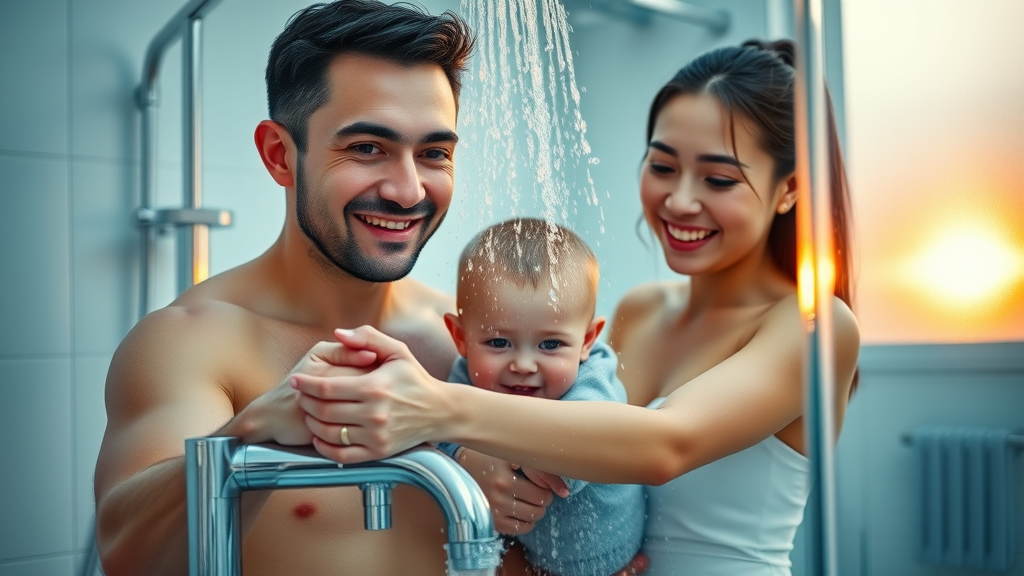
Action Steps: Choose the best type for your needs, check performance ratings, claim available rebates, and enjoy hot water with lowered utility costs—starting now!
Sources
Department of Energy – https://www.energy.gov/energysaver/heat-pump-water-heaters
ENERGY STAR – https://www.energystar.gov/products/water_heaters
Consumer Reports – https://www.consumerreports.org/appliances/water-heaters/buying-guide
National Renewable Energy Laboratory – https://www.nrel.gov/docs/fy17osti/68619.pdf
Upgrading to an energy-efficient water heater can significantly reduce your energy consumption and lower utility bills. For instance, the Rheem Performance Platinum Hybrid Electric Water Heater utilizes heat pump technology, making it one of the most efficient options available. It’s ideal for medium to large households and offers smart home integration for monitoring usage. ( dalmatianplumbing.com )
Additionally, the Rinnai High Efficiency Natural Gas Tankless Water Heater provides a compact, on-demand solution that heats water only when needed, eliminating standby energy losses associated with traditional tanks. This model is suitable for smaller households and offers a temperature lock feature to prevent accidental thermostat changes. ( bobvila.com )
If you’re considering an upgrade, these resources offer detailed insights into the latest energy-efficient water heaters, helping you make an informed decision tailored to your household’s needs.
 Add Row
Add Row  Add
Add 




Write A Comment